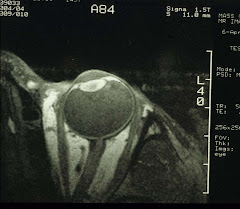 [Left] The caption reads: "Colossal squid corneas—relatively small parts of the animal's basketball-size eyes (file picture). Photograph by Marty Melville, Getty Images." - National Geographic Daily News (3/15/2012)
[Left] The caption reads: "Colossal squid corneas—relatively small parts of the animal's basketball-size eyes (file picture). Photograph by Marty Melville, Getty Images." - National Geographic Daily News (3/15/2012)This is incorrect, both appear to be the crystalline lens, not the cornea at all.
The colossal squid (Mesonychoteuthis hamiltoni) has basketball-sized eyes - "10.6-inch-wide", and someone is trying to figure out why eyeballs of this size are needed to see at an depth of the ocean where it is essentially pitch-dark.
The answer, according to the report seems:
"The team's models [developed by Dan-Eric Nilsson et al at Sweden's Lund University] revealed that, what the colossal and giant squid's supersize pupils and retinas lacked in close-up vision they made up for with extreme farsightedness. The cephalopods are fine-tuned to spot very large objects at a distance—such as the sperm whales that prey on the squid.
"Still, no matter how large the eye, or how big the object being seen, darkness presents a visual problem.
"With their great light-gathering capacity, squid eyes are able to detect even a faint glow the equivalent of a football field away, the study found.
"Not coincidentally, when a sperm whale is on the move, it disturbs tiny bioluminescent life-forms, creating a faintly glowing trail in the whale's wake—and giving squid an unintentional warning sign."
Hmm... the squids "lacked in close-up vision they made up for with extreme farsightedness"?
To spot tiny bioluminescence a football field away, emmetropic vision, i.e., 20/20 or better, is of course needed. If they are extremely farsighted, then accommodation is required, and if they don't have "close-up vision", then all bets are off. It'll be blurry as heck...











No comments:
Post a Comment